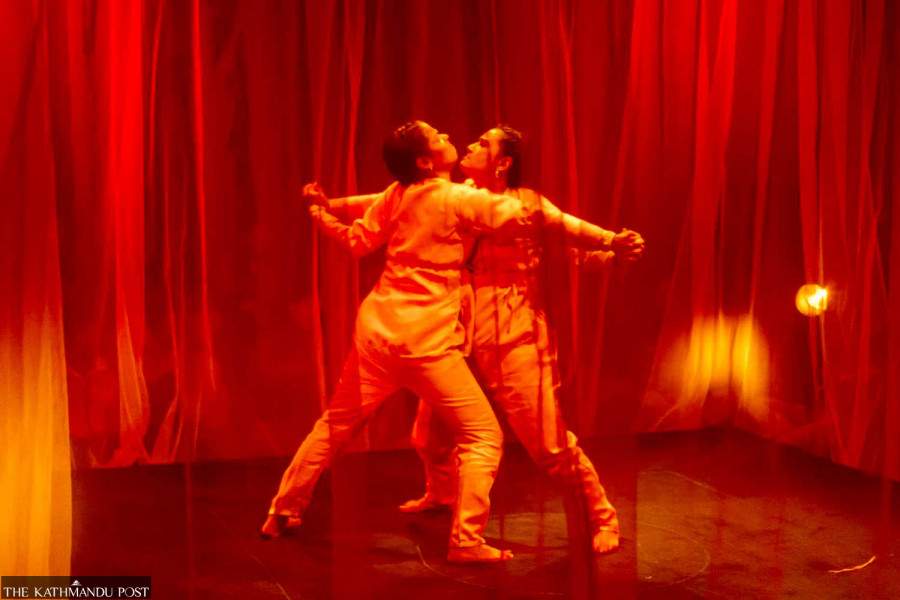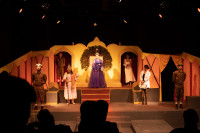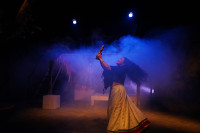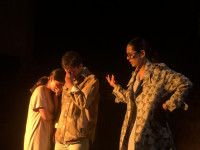Theater
A physical depiction of inner turmoil
Mandala Theatre’s ‘The Rose: An Awakening Journey of Yashodhara presents an unconventional, dialogue-free exploration of Yashodhara emotional rollercoaster following Siddhartha Gautam’s departure.
Manushree Mahat
Mandala Theatre’s latest production is unlike anything I’ve ever seen before, and I’m still making up my mind on how I feel about it. It’s not a play in the traditional sense—there are not more than two people on stage throughout the entire duration of its one-hour run, and there’s no dialogue, none at all. The abstract would be the suitable word to describe its genre, and a ‘theatrical experience’ would best describe what it is. It's different, that’s for sure, but whether or not it depends too much on its being ‘different’ to make it a worthwhile experience depends on its audience.
‘The Rose: An Awakening Journey of Yashodhara’, as the play is titled, is not the first time Mandala Theater has presented an abstract, experimental and physical theatre. ‘Territorium’, a cross-disciplinary performance by a Norwegian production, in collaboration with Durga Bishwokarma, was hosted by the theatre in 2020. In a review by the Post, Shashwot Pant astutely commended the uniqueness of the experimental work, while also addressing the concerns of a consistent pull it lacks, iterating that, “The performance seems to be trying to convey many things, without actually saying anything. This can be a double-edged sword—while the scope of understanding can be broad, it can also leave audiences clueless and confused.”
This observation perfectly describes the mixed feelings I hold towards the ongoing showcase in Mandala Theatre. While the striking choreography that replaces dialogues to express the vitality of desolation captures the sentiment in a unique way, at times, it struggles to hold the audience’s attention.
When it comes to physically emotive performances like this one, the set design is essential to capture the essence of the character’s dilemma, and it does so beautifully in ‘The Rose’. The production sufficiently brings the bleak ambience of the play together in its minimal but creative set direction.
The set design also reflects the play’s intentions to break traditions. In the centre of the room is a square, quaint stage, draped in see-through curtains. Sitting circularly, legs folded at comfortable and uncomfortable angles are the audience–so close to the actors, just a little movement, and you can basically touch the props.
This feels deliberate—the sensation of Yashodhara’s doom feels more palpable with the distance.
The sound of water dropping and the peaceful pink light at the beginning evoke a sensation of tranquillity, which is soon replaced by the agonised groans of the actors on stage.
On the stage are two actors (Deeya Maskey and Sarita Sah)—playing the same character—Yashodhara. They’re dressed in white, and in the first few minutes of the act, they’re playful and happy—running around the stage chasing an imaginary insect, it seems. Until a voiceover plays, and the whispers of Siddhartha Gautam leaving his family grip them.
This is the story that ‘The Rose’ intends to depict—the desolation of Yashodhara after Siddhartha Gautam leaves her and their newborn infant in search of enlightenment. What follows is a physical enactment of Yashodhara pain, anger and emotional turmoil, as the actors depend entirely on the movements of their bodies, and facial expressions to portray that anguish.
Both Maskey and Sah emulate the physicality of Yashodhara’s inner turmoil fantastically—their painful, and, at times, savage facial expressions capture the extent of the betrayal and abandonment they feel. The control they have in their movements, combined with their on-stage chemistry, makes it obvious they are one and the same people.
Having Yashodhara played by two actors on stage is an interesting choice. Ram Hari Dhakal attributed this creative choice to showing the opposing ends of an individual’s feelings, specifically the contrast between the mind and the heart. “We often hear people say, ‘Don’t think from the brain, do it from the heart’ and this is what we intended to show: the inner conflicts between the two parts of you,” says Dhakal.
Dhakal is a director who delights in experimental theatre like this one. His previous works like ‘The Wheel’, and ‘Inside/Outside’ have been sensory theatre–both unique theatre experiences where the audience becomes the participants of the performances.
The lack of a dialogue in the act is another risky choice. It means that the performance and the actors on stage have to be captivating enough to hold the audience’s attention without things getting too tedious.
“We wanted to show Yashodhara’s inner journey and pain. Siddhartha Gautam leaves Yashodhara at a time of happiness, at a time when a chapter of their life would have begun. To depict her emotional and mental turmoil, and how she freed herself from that pain, we thought the body and the physical movements would do a better job than dialogues,” says Dhakal.
This is where things get tricky. Although the actors depict the potency of Yashodhara’s pain in their downcast, angry expressions, as well as their torturous physical movements, it’s still not enough to ensure the audience remains enraptured throughout the show.
The vision behind this abstract theatre is noble and worth mentioning. There are intense moments in the play, like when Yashodhara rips apart the curtains on the stage to stuff them inside her own clothes when the agony on the stage is difficult to watch. Dhakal spent months reading books about Yashodhara to bring authenticity to his depiction. He also wishes the audience to interpret his work in their own way.
The showcase is out-of-the-box, and it must be said that it is the kind of work, not everybody will appreciate. But that’s the thing; art is subjective. If you’re someone who takes joy in interpreting the meanings behind art, who is okay with the idea of there not being a solid plot or dialogues, and harbours interest in the strength of production design in a theatrical work, ‘The Rose’ is the type of theatre for you. It is an experience, and art is all about experimenting, after all.
‘The Rose: An Awakening Journey of Yasodhara’ will continue till January 7 at Mandala Theatre, New Baneshwar, Kathmandu.




 16.12°C Kathmandu
16.12°C Kathmandu











